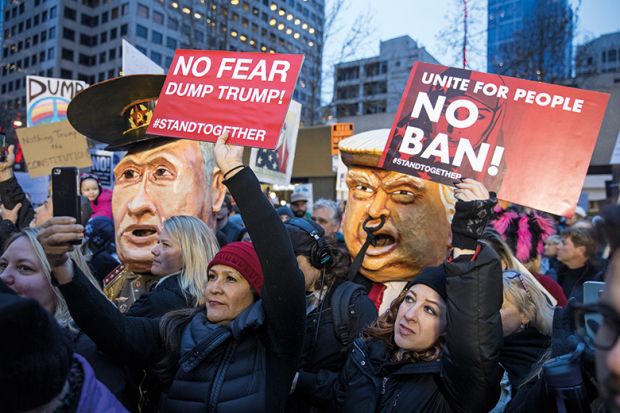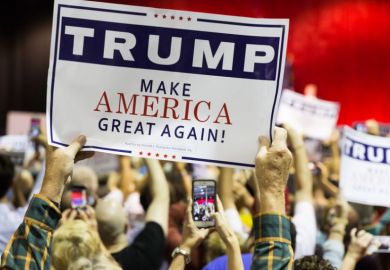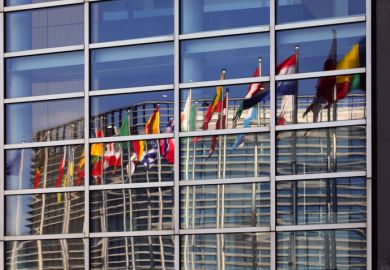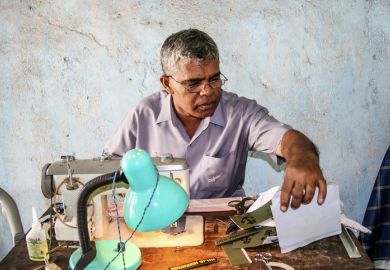British-Iranian academics have spoken of their “shock and horror” in response to Donald Trump’s ban on travellers from seven Muslim-majority countries, warning that it will harm research collaborations, while some scholars are already planning to boycott the US.
The US president signed an executive order on 27 January imposing an immediate 90-day ban on visitors from Iran, Iraq, Libya, Somalia, Sudan, Syria and Yemen from entering the US.
Although the UK government’s foreign office said on Sunday that UK dual nationals should not be affected, academics who were born in one of the seven countries are concerned that it will prevent them travelling to the US for meetings and conferences and may harm their research.
Ali Mobasheri, professor of musculoskeletal physiology at the University of Surrey, who was born in Iran but only holds a British passport, said that he is due to be inaugurated as president-elect of the Osteoarthritis Research Society International (OARSI) in Las Vegas in April, at the society’s annual world congress, but he is concerned that he will be unable to get a visa or be turned away at the airport because of his background.
Professor Mobasheri also has plans to attend a meeting in Boston in October.
Since December 2015, foreigners who had visited certain Muslim-majority countries, including Iran, in the past five years or held dual citizenship from one of those countries have had to apply for a visa.
“There’s a lot of uncertainty,” he said. “We all reacted with shock and horror to the news. I have been going quite freely and happily to the US dozens and dozens of times over the past 20 years.”
He added that Dutch and Canadian colleagues in the OARSI, who are not affected by the ban, have already mentioned the possibility of “boycotting the US meeting” in order to “send a strong message” against the treatment of those from Muslim backgrounds.
“If policies like this become law and are enforced, then a lot of international societies won’t hold meetings in the US,” he said.
Arshin Adib-Moghaddam, professor in global thought and comparative philosophies at Soas, University of London, who has an Iranian background, said that he is due to undertake a lecture tour of the US later this year about his forthcoming book Psycho-nationalism, which is about the current politics of xenophobia and division. But he said he will cancel the tour if “the current situation prevails”.
“I will not expose myself to a belligerent, xenophobic and uneducated political context in the United States. I think this executive order anti-cultural and discriminatory, bordering on racism,” he said.
Abbas Edalat, professor in computer science and maths at Imperial College London, who has dual British and Iranian nationality, said that he stopped submitting research papers to US conferences last year owing to the visa restriction but added that Mr Trump’s order will make more dual national academics “think twice” before visiting the US, as visa applications will be subject to “more vetting”.
“Often, you have to organise to travel with a few days’ or a few weeks’ [notice] so there is no time to apply three months before to get a visa,” he said.
Last week, Michael Eisen, a geneticist at the University of California, Berkeley and co-founder of the Public Library of Science (Plos) journals, announced that he will run for the US Senate in 2018, in order to bring a scientific voice to politics.
At the time of going to press, more than 4,000 academics, including 25 Nobel laureates, had signed a petition calling on Mr Trump to reconsider his order.
Register to continue
Why register?
- Registration is free and only takes a moment
- Once registered, you can read 3 articles a month
- Sign up for our newsletter
Subscribe
Or subscribe for unlimited access to:
- Unlimited access to news, views, insights & reviews
- Digital editions
- Digital access to THE’s university and college rankings analysis
Already registered or a current subscriber? Login







